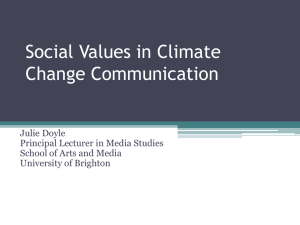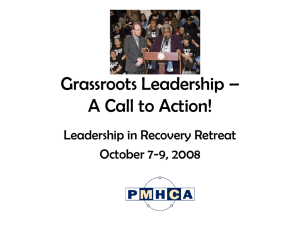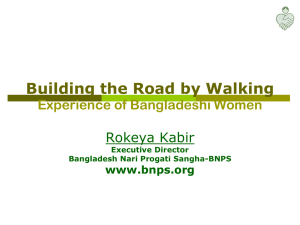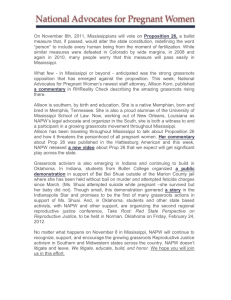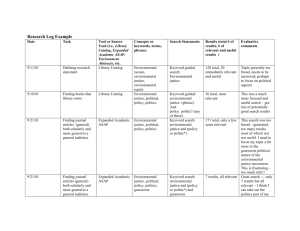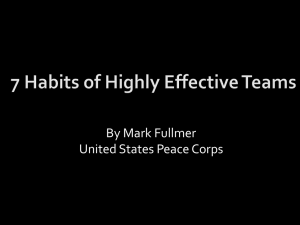Choosing a Win-Win World
advertisement
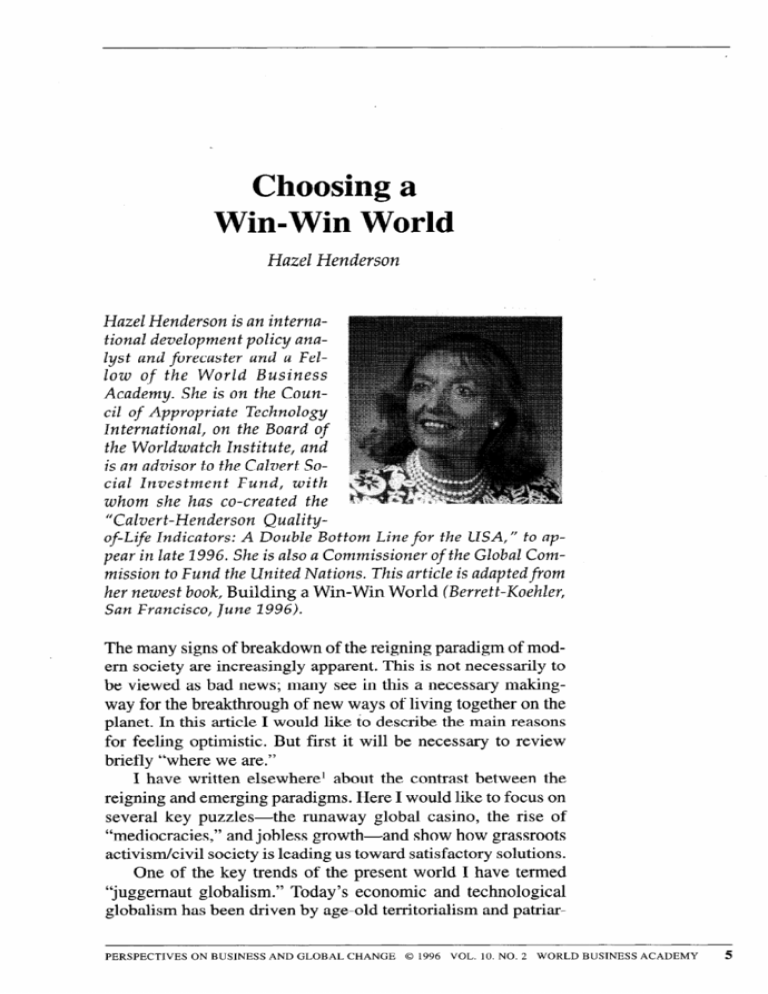
Choosing a Win-Win World Hazel Henderson Hazel Henderson is un international development policy unuIyst and forecaster and II Fellow of the World Business Academy. She is on the Council of Appropriate Technology Interna:tional, on the Bolzrd of the Worldwatch Institute, and is an advisor to the Calvert Social Investment Fund, with whom she has co-created the “Culvert-Henderson Qualityof-life Indicators: A DoubEe Bottom Line for the USA,“ to appear in late 1996. She is also a Commissioner of the GEobal Commission to Fund the United Nations. This article is adapted from her newest book, Building a Win-Win World (Berrett-Koehler, San Francisco, June 1996). The many signs of breakdown of the reigning paradigm of modem society are increasingly apparent. This is not necessarily to be viewed as bad news; many see in this a necessary makingway for the breakthrough of new ways of living together on the planet. In this article I would like to describe the main reasons for feeling optimistic. But first it will be necessary to review briefly “where we are.” I have written elsewhere’ about the contrast between the reigning and emerging paradigms. Here I would like to focus on several key puzzles- the runaway global casino, the rise of “mediocracies,” and jobless growth-and show how grassroots activism/civil society is leading us toward satisfactory solutions. One of the key trends of the present world I have termed “juggernaut globalism.” Today’s economic and technological globalism has been driven by age-old territorialism and patriarPERSPECTIVES ON BUSINESS AND GLOBAL CHANGE 0 1996 VOL. 10. NO. 2 WORLD BUSINESS ACADEMY 5 6 PERSPECTIVES The new forces of globalization already undermined national sovereignty. have ON BUSINESS AND GLOBAL CHANGE chal structures of competition. Today’s Information Age markets, driven by galloping competition, have spun off into financial cyberspace, divorced from the realities of Main Street, human needs, and nature’s ecosystems. Over 90 percent of global financial flows (roughly a trillion dollars a day) are speculative. Ever more complex derivatives and “risk management” instruments, designed to protect individual players in the financial market, add to systemic instabilities and risks. The new forces of globalization have already undermined national sovereignty, not only in domestic macroeconomic management of fiscal and monetary policy, but also in the loss of social policy options in the areas of health, education, safety nets, employment, environment, and even the values and culture of their citizens. The new global “electronic commons” now engulfing national sovereignty can be made to work only if we adopt “win-win” rules. The globalizing of technology, production, information, financial flows and stock markets, migrating jobs and workers, arms trafficking, and pollution have rendered obsolete the economic tools by which nations have attempted to manage domestic national affairs. Nevertheless, economic and political thinking is still dominated by assumptions that economies are national and can be managed for the benefit of each nation’s citizens; that competitive markets can allocate resources between guns, education, public transit, and investments in research and development; that relative distribution of income, wealth, power, and information between people need not be of central concern; that nature’s capital (clean air, water, and the environment) is still essentially free and inexhaustible; that scarce resources can always be substituted; and that the planet can continue absorbing human and industrial wastes, which are accounted for as mere “externalities” in economic analysis. These assumptions no longer serve us well. Other assumptions, more subtle, also confuse our thinking: l l That humans predominately compete to maximize their individual self-interests (an assumption that ignores the 50 percent of productive work in all industrialized countries, and higher in developing countries, that is unpaidhousehold maintenance, work done through altruism, food growing, do-it-yourself home building and repairs, etc.); That “free trade” is always in the best interests of everyone (because it appears to lower prices for consumers, but in fact these prices fail to include full social and environmental costs); Henderson: l l l l l l CHOOSING A WIN-WIN WORLD That the spread of markets and privatization democratizes and that democratic machinery is adequate for full participation; That “industrial policy” is always bad (although all countries have it-in the U.S. it includes actively promoting the largest arms exports in the world); That the GNP can continue to measure “progress”; That “investment” in the private sector is always good (whether in research to innovate a new brand of dog food or in fiber optics, whether in a new toy factory or another savings and loan association); That public-sector expenditure in maintaining infrastructure (roads, dams, public buildings, airports, etc.) is a drain on the economy (a confusion arising because public facilities are not carried in the national accounts as assets); That endlessly improving economic efficiency and productivity by substituting capital, energy, and resources for human inputs of skills and labor will automatically contribute to increasing prosperity (whereas it is bringing, instead, ‘tjobless economic growth,” widening poverty, and social disruption). This last assumption, that economic efficiency and labor productivity automatically bring good results, is especially troublesome. Jobless economic growth is the result of the industrialization paradigm and its focus on narrowly accounted production efficiency and labor-saving technologies. This focus drives economies toward greater capital intensity and mechanizationeven as politicians promise full employment. Fewer workers with more sophisticated tools produce more goods and serviceswhile poverty rates, unemployment, and welfare rolls rise. The unwillingness to examine what kind of productivity indicates the paradigm problem. Total productivity formulas should include management productivity, caphaL productivity, investment productivity, R&D productivity, energy productivity, environmenta2 productivity, and social productivity (production of fruitful lives and healthy communities). An out-of-control “‘global casino” and the “jobless productivity trap” are only two among many facets of the difficulties with the modern paradigm. Today, the most creative, energetic forces addressing the planetary problems of poverty, social inequity, pollution, resource depletion, violence, and war are grassroots citizen movements, Grassroots globalism is about -7 8 The rise of civil orgfznizatims is une uf the most striking phenomena of the twentieth century. PERSPECTIVES ON BUSINESS AND GLOBAL CHANGE thinking and acting-globally and locally. Its problem solving is pragmatic; local solutions that keep the planet in mind. Grassroots globalists and their organizations are often spumed by governments as amateurs, agitators, or troublemakers. Even the United Nations has warmed only slowly to citizen organizations- nongovernmental organizations (NGOs). NGOs are now emerging as a third, independent sector in world affairs-challenging the domination of global agendas by nation states and transnational corporations. The global civil society, newly interlinked on the Internet and by millions of newsletters, is increasingly driving agendas of nations and corporations. In Chapters 10 and 11 of my book, I offer new measures beyond GNP and new tools for civic participation. The rise of civil organizations is one of the most striking phenomena of the twentieth century. The UN became a natural venue for new national and transnational concerns. Newer organizations, such as the National Organization for Women, Friends of the Earth, Greenpeace, and Zero Population Growth in the U.S., joined older NGOs, such as Planned Parenthood and the Swiss-based International Union for the Conservation of Nature, to push issues onto the agendas of national governments. Such pressure on member-states, from NGOs in both the North and South, resulted in a series of ad hoc conferences, notably those on Environment (1972), Population (1973), Food (1974), Women (1975), Habitat (1978), New and Renewable Sources of Energy (198 l), Environment and Development (Earth Summit) (1992), Human Rights (1993), Population and Development (1994), Social Development (1995), and Women and Development (1995). At each one of these UN conferences it became successively more recognized that the agendas had been shaped by new citizen organizations and broader social movements bringing pressure on member-states’ governments. Together they have amounted to a 25-year effort to steer the course of economic development toward new values: ecological sustainability, poverty reduction, and recognition of the key role women play as the world’s primary food producers, educators of children, and protectors of the environment. The United Nations is ideally suited to foster global agendasetting, research, and agreements to manage the global commonheritage resources of the planet. In fact, the UN is the only institution truly positioned to convene, foster, and broker all the actors and institutions in government, business, finance, academia, and the global civil society. It is not merely a “trade association” of nations, where member-states can control its agenda by withholding dues. Its Charter identifies its fundamental constituents Henderson: CHOOSING A WIN-WIN WORLD as “We, the peoples” -the global civil society composed of private, voluntary, nongovernmental organizations and enterprises, which are powerful constituencies within member countries as well. If member governments try to starve the UN financially, such groups will see to it that the UN’s functions in the areas of human rights, global standard-setting, health, education, environmental monitoring, and human development are funded in alternative ways. Citizen organizations have emerged worldwide as major actors and leaders in areas such as the search for global ethics and healthy, survival-enhancing “cultural DNA codes.” They have staged citizen summits on vital issues whenever leaders have dragged their heels. Civil society participation has focused worldwide attention on vital global issues and formerly “radical” notions, including the ideas that the most effective contraceptive is the economic and political empowerment of women, and that the best investment a society can make for development is investment in its people, particularly the education of girls. Two key issues signal the maturing of grassroots globalism and the growing international clout of its civil organizations. First is the new issue of legitimacy -raised by corporate executives, government officials, politicians, and competing political parties: ‘Whom and how many people does this group represent and are its policies steered democratically?” Civil organizations address this valid question by opening their decision making, membership, fund-raising practices, and policy processes to public scrutiny. Some groups and leaders enjoy such popular support that they constitute a recognized threat to existing power structures. A second sign of maturity is the proliferation of approaches, tactics, and goals. Today, grassroots globalism grows stronger as nations lose sovereignty in the turbulent seasof trillion-dollar daily capital flows. Countries less able to manage their domestic economies to maintain employment and social safety nets must foster grassroots self-help. Even global corporations now know they cannot make executive decisions on factory closures and siting, for example, exclusively to benefit their stock and bond holders. They now consult wider groups of stakeholders: employees, suppliers, customers, environmental groups, and now grassroots globalists as well. Grassroots globalists have gradually become accepted-even welcomed-for their innovative projects. Formerly scorned citizen groups are not only urged to become more involved with peacekeeping, peacemaking, and sustainable development, but also with watchdogging reduction of arms sales, disarmament, and conversion to civilian economies. The new watchword to 9 10 In the long run, all our individual self-interests are identical PERSPECTIVES ON BUSINESS AND GLOBAL CHANGE global business and government leaders in the perilous decade of the 1990s is “Lead, follow, or get out of the way.” This apparent militancy is related to the growing sense that humans have now only a few decades to avert social and ecological disaster: In the long run and in a planetary context, all our individual selfinterests are &~~tl’caZ. Now, what are some of the things that need doing, and indeed, what are some of the innovative paradigm changes already in progress? Beyond my prescriptions for new “quality-of-life indicators” to complement GNP, we need to rethink scarcity, abundance, needs, and satisfaction-which leads inevitably to wholesale redefinitions of money, wealth, productivity, efficiency, and progress. However mindblowing, a prerequisite of this new thinking is the understanding that money isn’t Scarce and that its apparent scarcity is a major social regulatory mechanism. When functioning well, money provides a beneficial circulatory system for wider human exchange beyond face-to-face barter. This social invention, designing markets as predominant resourceallocating systems, was first adopted in seventeenth-century Britain. While Adam Smith was its great proponent, he recognized that markets could function properly only if, first, all players met in the marketplace with equal power and information, and second, no harm was caused to innocent bystanders. In preindustrial and traditional societies, most land and natural resources were held communally and known as “the commons”the +village green, as the common grazing land of England was termed. From a systems viewpoint, markets are open systems with abundant resources that can be used individually and competitively, while commons are closed systems where resources are used indivisibly-for example, national parks, air, oceans, satellite orbits, and the electromagnetic spectrum. With modern information technologies, the world’s peoples could be linked at every level as producers and consumers by information exchanges, the world’s new currencies. Information, unlike material goods, isn’t scarce? If you give me information, you still have it, and we are both richer for having shared it-a win-win situation. Instead, a few media moguls now control the human family’s “imagebank” in “mediocracies” that have superseded democracies. Thus we see the rise of nonmoney, information economies (local, regional, and global networks for barter, countertrade, reciprocity, and mutual aid) wherever macroeconomic management is failing in societies. Money and information are equiva- Henderson: CHOOSING A WIN-WIN 11 WORLD lent-if you have one, you can get the other. Today, money often follows information (and sometimes misinformation). Markets are revealed as less than efficient because they ignore social and environmental costs and assume that people will maximize their narrow self-interest, rather than being driven by multiple, complex motivations. Governments can now go around the money monopoly and conduct sophisticated barter and counter-trade deals directly (as do corporations). According to some estimates, up to one-quarter of all world trade is already done this way. Money, essentially, is a unit of account entered on various ledgers to track and keep score of human production, services, and transactions as they interact with each other and nature’s resources. As central bankers know, money is not scarce, and it can serve as a stable store of value if its supply is controlled to correspond with and track expanding production and exchange transactions. When governments and central banks supply too much money and spend or invest too much (beyond tax receipts) in short-term or unsustainable projects and public services, money loses its purchasing power- inflation setsin. Modern societies have had great difficulty in investing wisely in creating future societal assets (whether the goal is healthy, educated citizens, productive infrastructure, or maintenance of natural resources and environmental quality). As national borders are swamped by waves of hot electronic money, national macroeconomic tools (i.e., fiscal and monetary policies) become ever more erratic. National sovereignty is fast becoming a nostalgic slogan-now ebbing away from all governments since the widespread deregulation of capital markets in the 1980s and the establishment of the World Trade Organization (WTO) in 1995. People everywhere are realizing that money and credit are used also as p&iticaZ t&s to create incentives and substitute for regulation. Aware grassroots globalists also know that money can no longer be effectively used as the major tool to denominate broader indicators of quality of life and progress or to provide accurate data to manage national economies or the world trade system. Thus grassroo& NGOs all over the world are now challenging the political underpinnings of the global financial system, which includes the World Bank, the International Monetary Fund (IMF), and the General Agreement on Trade and Tariffs (GATT). This system has not been overhauled since its founding under the United Nations in 1945 at the famous Bretton Woods Conference. NGOs are challenging the political underpinnings of the globaljZnanciul system. 12 PERSPECTIVES . ON BUSINESS AND GLOBAL CHANGE Calls for democratizing the Bretton Woods institutions have grown out of the development failures in the 1980s. Instead of progress, the decade saw development in Africa, Asia, and Latin America bog down in mountains of unrepayable debt, widening gaps between rich and poor, and ecological devastation. Reformers seek wider access to credit for private groups, local enterprises, villages, and many other NGOs and communities for local “bubble-up” development. Campaigns to democratize the secretive governance of the World Bank, the IMF, and the WTO will persist until their political assumptions are teased out of their economic models and their relationships with governments, banks, securities traders, stock exchanges, and bond holders are made clearer. As the crises and failures of macroeconomic management become more evident worldwide, people at the grassroots are rediscovering the oldest, most reliable safety net: the nonmoney, pure information economy. Information is even more basic than money to human transactions and trade. Over half the world’s production, consumption, exchange, investments, and savings is conducted outside the money economy-even in industrialized countries. In many developing countries, the official moneydenominated economies tracked by national accounts and GNP are less than one-third of all the economic activity of these often traditional subsistence economies and societies. Independent, urban money systems have always flourished whenever central governments mismanaged national affairs. Today, ordinary people are not sitting idle hoping centralized economic managers can help them. Local communities see the confusion at the top and are not waiting. Hundreds of Local Exchange Trading Systems (LETS) are in operation around the world, essentially creating an alternative currency through computerized tracking of goods and services offered and exchanged, and thus creating work opportunities where in the absence of such an alternative currency, economic stagnation and painful unemployment would prevail. Many forms of “service credits” or “time dollars” are in use in cities around the world. One of the most sophisticated cooperative exchange systems is Switzerland’s WIR-Messen, now over a half-century old. A vast range of goods and services from insurance, banking, credit, and transport to manufactured goods-computers, furniture, and luxury items from furs to antiques-are offered for sale in the cooperative’s scrip, “WIRs.” These exchanges have created thousands of jobs and many new business enterprises, and fostered community self-help programs in many Swiss cities; the cooperative includes as members a large number of Swiss companies Henderson: CHOOSING A WIN-WIN WORLD willing to accept WIRs at least partially interchangeably with Swiss francs. There has also been much grassroots interest in taming the “global casino.” An appropriate tax on foreign exchange, in the range of .OOl to .003 percent, could do much to reduce speculative currency trading. This would not harm trade in real goods and services or longer-term investments, but would mount up rapidly on the short-term daily transactions of speculators. This small tax would easily yield the cost of its administration, plus a percentage to be retained by the collecting governments, with a balance replenishing currency stabilization and development funds. Despite strong opposition from traders, central banks, and finance ministers, the issue is kept very much alive by global civil society. Numerous explorations have been undertaken of the different ways to tame the global casino. Professor Ruben Mendez of Yale University proposes a social innovation that may work in conjunction with a currency exchange tax or as an alternative to it. Mendez proposes a not-for-profit foreign exchange facility (or FXE) to perform foreign currency exchange transactions. The FXE would be set up as a public utility, to offer competition to the small group of private money-center banks that now exert a virtual monopoly on foreign exchange trading. The FXE could simply offer lower prices per transaction, attract much of the business, and generate revenues for, for example, UN programs. Imagine walking through an airport looking for a booth to exchange your money and finding a new booth where a percentage of the exchange fees would go not to a private bank, but to UNICEF. Grassroots interest has also focused on the contribution of current taxation systems to such problems as environmental deterioration and unemployment. Countries need to rebalance their tax codes to make them neutral between employment and capital investment, recognizing that excessive tax credits from capital investment in automation (in both goods and services) are key drivers in corporate downsizing and jobless economic growth. Introducing employment tax credits, pollution taxes, and value extracted taxes (VET) to substitute for value added taxes (VAT) and income and corporate taxes, could create conditions for both environmental sustainability and full employment. As long as employers are burdened with more taxes and employee benefits, their decisions will be skewed toward fewer full-time employees and toward unemployment. A much broader principle is involved here than may be apparent. There is widening confusion between the two key indi- 13 Cuuntn’es need to rebalance their tax codes. 14 PERSPECTIVES ON BUSINESS AND GLOBAL CHANGE vidual signals from people to their decision makers in government and business-votes and prices. These two vital forms of feedback are failing to deliver enough timely information on the effects of policies and multiple restructurings to adequately guide and correct decisions. Votes every two or four years are too slow and cannot refine voters’ feedback on multiple issues, while prices cannot guide markets without incorporating the fuller social and environmental costs of products and services. Grassroots global organizations are the new way in which “We, the peoples” are providing this necessary feedback for either democracy or markets to work well. Among the most important news is that the financial and business community is becoming a friendly collaborator with the newly emerging global civil society, recognizing that the only world in which any of us can satisfy our self-interest is a winwin world. Maurice Strong achieved a pioneering involvement of the business community through inviting his friend Stephan Schmidheiny and the World Business Council for Sustainable Development to produce their own report3 to the Rio Earth Summit in 1992. At the 1995 Copenhagen World Summit on Social Development, a Business Council for the Social Summit (SUSCO) was organized by Oliver Giscard d’Estaing, co-founder of INSEAD, the Harvard Business School of Europe, and they released their own report, The Evolution of t!zeMarket Economy. The German Foundation for International Development’s Policy Forum also produced a report, innovative Resource Management for Social Development. These reports are included in the volume The United Nations at Fiffty.4 The United Nations at Fifty also reviewed many of the new “codes of conduct” promulgated by business groups, such as the Caux Roundtable, the CERES Principles, the Calvert Social Investment Fund’s principles, and the Minnesota Principles of Corporate Responsibility. To be sure, these codes of conduct are often casually dismissed by cynics, but they do tend to gradually solidify via legal precedent and eventually form the basis for international protocols. Many other recent examples display this new tendency of people in and out of business to talk together and undertake collaborative actions. “Money Matters” inquiries held in Copenhagen, Boston, Kuala Lumpur, Cairo, and Sao Paulo explored how best to steer pension funds and other managed assets-particularly those in socially responsible, clean, green, and ethical funds-into real grassroots local development. In June 1995 a group of private-sector leaders held a historic meeting with the UN Economic and Social Council (ECOSOC) for an Henderson: CHOOSING A WIN-WIN WORLD exchange of views that led to a reinvigoration of this important body. The World Business Academy’s Brian Bacon helped forge a historic cooperation between business and the ILO, launching business-labor partnerships for social development in Bombay, Tokyo, Nairobi, Bangkok, Dubai, Vietnam, and Mauritius. In January 1996, the World Business Academy and the International Labor Organization leaders in Partnership for Social Development met in Hyderabad, India, to assessthe progress of recent cooperative projects. Such coalitions are driving the new agendas and the move toward more equitable, people-centered, ecologically sustainable development, as well as questioning the growth of material consumption as the foundation of GNP/GDPmeasured “progress.” The new values and lifestyles beyond materialsm require innovations in economics, and I therefore suggest reclassifying the economy to “de-materialize” it. Economics has always assumed that money and resources were scarce; it should now focus on time and attention as the new scarce factors. The rising economies are based on the real scarcity of human attention and time. Everyone in today’s technological societies is in an attention-deficit mode. This is not a disorder, but a natural mechanism wherein people are “going inside” and attending to their own inner values and personal development. Recent statistics on “down-shifters” are an expression of this phenomenon and presage the rise of Attention Economics+ These new “attention economies,” based on services and personal growth and social and cultural development, are already the largest sectors and can take up the slack as material-based GNP-growth continues to sag. In short, much realistic hope for the planetary future resides in the rapidly evolving global civil society, and in the growing collaboration among the United Nations, business, and grassroots globalists. As a result, we now have the possibility of choosing a win-win world. 1. Hazel Henderson, Paradigms Berrett-Koehler, 1995. in Progress. San Francisco: World’s New Cur2. See Hazel Henderson, “Information-The rency Isn’t Scarce.” World Business Academy Perspectives, Vol. 8, No. 2, 1994. 3. Stephen Schmidheiny, Press, 1992. Changing Course. Cambridge, MA: MIT 15 16 PERSPECTIVES ON BUSINESS AND GLOBAL CHANGE 4. Harlan Cleveland, Hazel Henderson, and Inge Kaul, Eds., The United iVations at Fifty: PoEicy and Financing Alternatives. Special issue of FUTURES, Vol. 27, No. 2 (March), 1995. Oxford: Elsevier Scientific. New U.S. edition available from the Global Commission to Fund the United Nations, Washington, DC.
